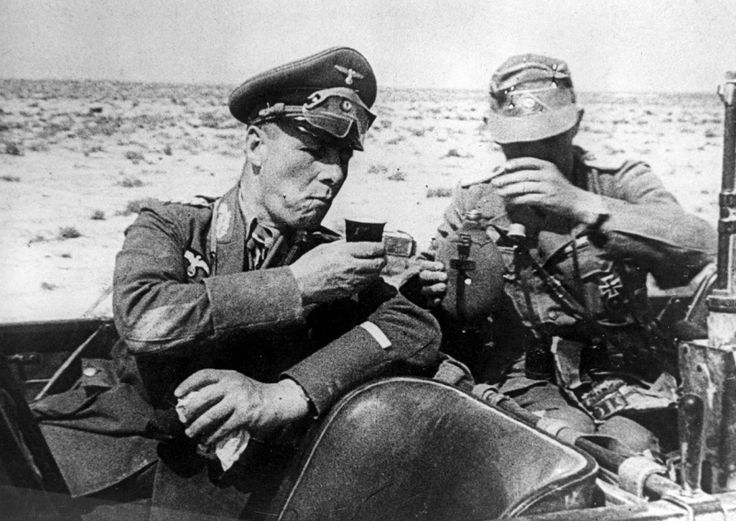
Erwin Rommel (15 November 1891 – 14 October 1944), one of the most recognizable faces of World War II, was a German general and military theorist. Popularly known as the Desert Fox, he served as field marshal in the Wehrmacht of Nazi Germany during World War II. For more information, click here. Rommel was a highly decorated officer in World War I and was awarded the Pour le Mérite for his actions on the Italian Front. In 1937 he published his classic book on military tactics, Infantry Attacks, drawing on his experiences from World War I. In World War II, he distinguished himself as the commander of the 7th Panzer Division during the 1940 invasion of France.
Heavy fighting continues all around the perimeter of Stalingrad on December 25, 1942. Inside the city, the decimated and starving troops of the German Sixth Army receive their last rations of meat — the 12,000 horses in the city all having now been slaughtered for food. In the Pacific, the Japanese base at Rabaul, on the island of New Britain, is attacked by American bombers based at Guadalcanal. In a Christmas broadcast from the Vatican, Pope Pius XII condemns the extermination of people by race, but fails to specifically mention the Nazis.
At Algiers, Algeria, on December 26, French authorities execute Bonnier de la Chapelle, the assassin of Vichy French Adm. Jean Darlan. Rommel’s forces halt at Buerat, Libya. He receives orders from Mussolini to make a stand there. In Russia, the Soviets continue their advance on the southern front and claim 56,000 Axis prisoners taken in the middle Don region.
On December 27, Gen. Henri Giraud takes command of all French troops in North Africa, a position originally promised to him by Gen. Eisenhower but given instead to the late Adm. Darlan. In the German-occupied portion of the Soviet Union, captured Soviet Gen. Andrey Vlasov, under German auspices, forms a committee to organize opposition to Stalin. The group will later be known as the Russian Liberation Army.
The Japanese on December 28 order a withdrawal of their troops from Buna, Papua-New Guinea. In the Soviet Union, German Army Group A receives orders to retreat from the Caucasus. In London, Gen. Charles de Gaulle, commander of Free French forces, welcomes Gen. Henri Giraud’s appointment as commander of French forces in North Africa, and issues a call for French unity. In Washington, President Roosevelt confirms a policy going forward of non-cooperation with the British in atomic research, a stance his advisers have been strongly recommending. Roosevelt orders that no further research information is to be given to British
scientists unless it pertains directly to an area in which they are working. At this point in the Manhattan Project, the focus will be changing from basic research to the design and production of a working bomb, and it is felt that severely restricting information will better ensure secrecy.
The British Eighth Army reaches Buerat, in western Libya, on December 29 as it continues to chase Axis forces across North Africa. Rommel, who had arrived there three days earlier, ignores Mussolini’s mandate to stand and fight, and moves on.
Singing idol Frank Sinatra makes his solo debut at the Paramount Theatre in New York City on December 30. In the audience, some 5,000 “bobby-soxers” scream and shriek during his performance, making it almost impossible to hear the young crooner.
On December 31, in the Battle of the Barents Sea (a part of the Arctic Ocean north of Norway and Russia), the German pocket battleship Lützow, the heavy cruiser Admiral Hipper, and six destroyers attempt to destroy the Allied Arctic convoy JW-51B that is headed for the Soviet Union. Although outnumbered, the convoy’s British naval escorts use superior tactics and exploit German caution arising from their orders not to sustain serious damage. One German destroyer is sunk, while the British also lose one destroyer and have one badly damaged. The failure to inflict any significant damage on the convoy (all 14 merchant ships make it to their destination) infuriates Adolf Hitler, and reinforces his belief that the German surface fleet is tying up a huge amount of manpower and resources for very little result. Der Führer orders that future naval strategy be focused on submarines instead of sorties by major German surface vessels. In Tokyo, the Japanese High Command, with the concurrence of Emperor Hirohito, decides to abandon Guadalcanal. In the Occupied Netherlands, potatoes are rationed







